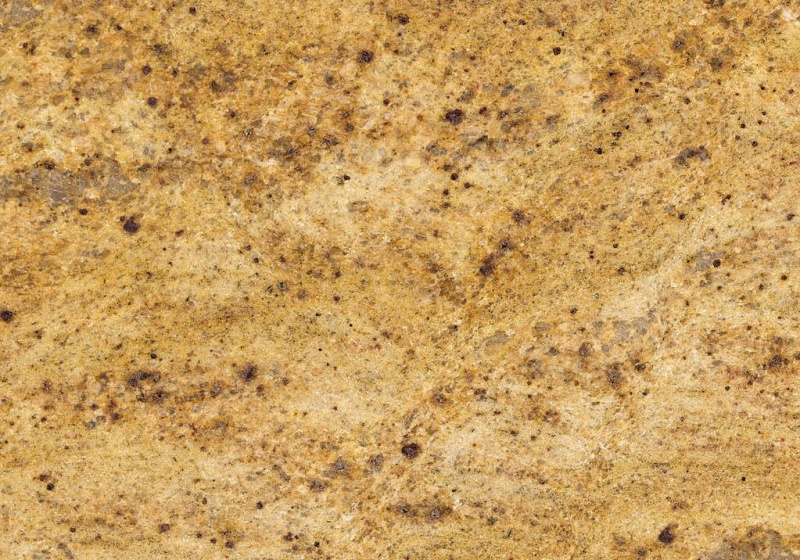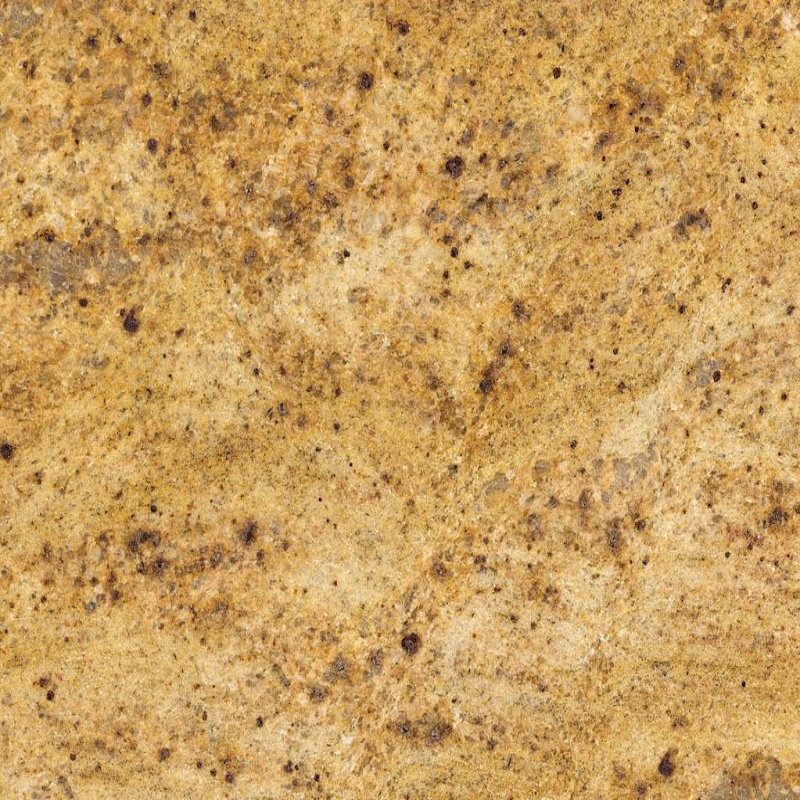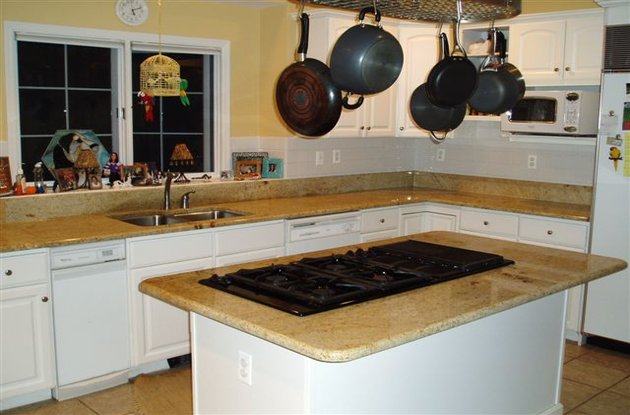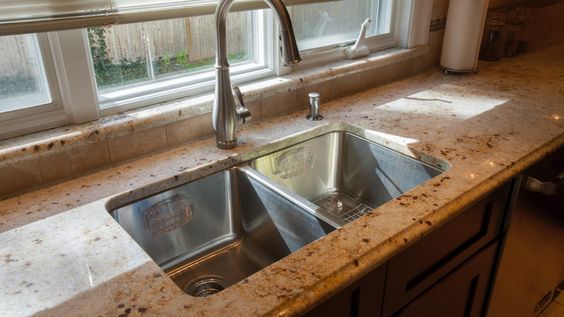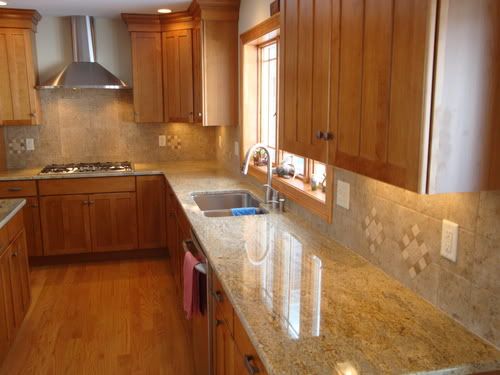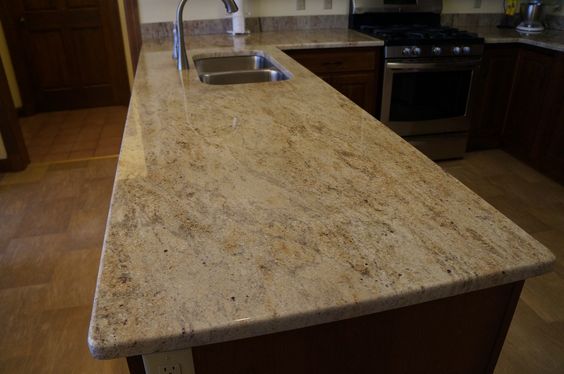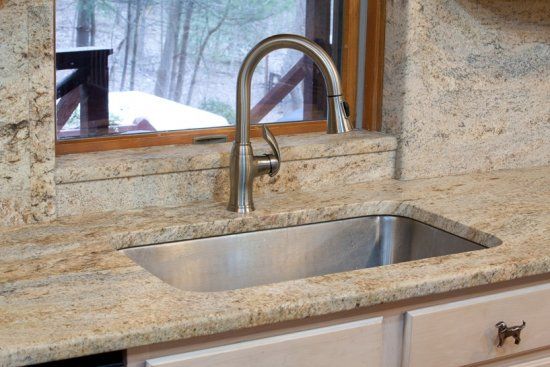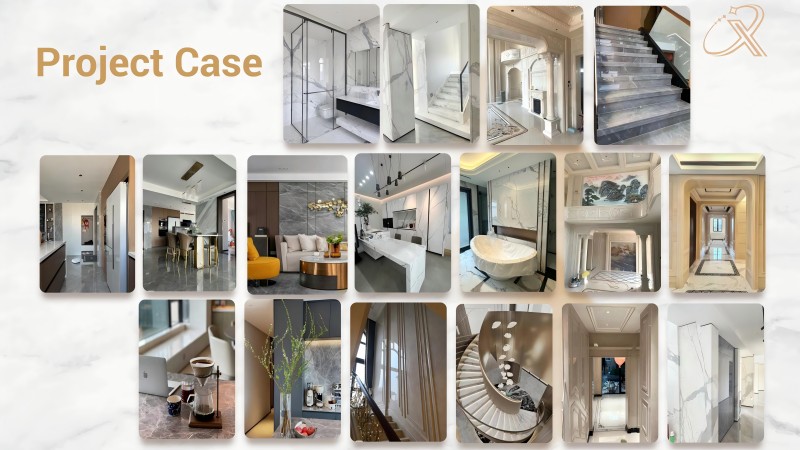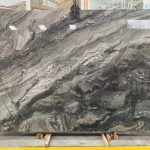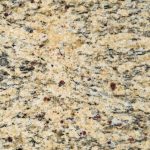Kashmir Gold Granite
Kashmir Gold Granite is a popular and highly sought-after variety of granite that originates from the Kashmir region in northern India. It is known for its rich golden tones, often accompanied by swirls or veins of cream, beige, and brown, making it an attractive choice for countertops, flooring, and other decorative applications.
The unique color variations in Kashmir Gold Granite are influenced by the mineral composition of the stone, which typically includes feldspar, quartz, mica, and other natural minerals. This gives it a vibrant, luxurious appearance that can complement both modern and traditional design aesthetics.
Kashmir Gold Granite is highly regarded for its beauty and durability. Here are its key characteristics:
1. Color
- Primary Color: Rich golden yellow hues.
- Secondary Colors: Cream, beige, and brown tones.
- Veining: It often has subtle veins or patterns that can be light brown, black, or cream, creating a dynamic yet elegant appearance.
- Consistency: The color and pattern can vary from slab to slab, with some featuring more pronounced veining or a more uniform golden background.
2. Pattern
- The granite features a mix of swirls and veins, giving it a natural, fluid look.
- Patterns may range from fine speckling to bold, irregular veins, providing a unique aesthetic for each slab.
- Each slab can be quite distinct, making it important to select the pieces based on preference for pattern and color intensity.
3. Origin
- Sourced primarily from the Kashmir region in northern India, an area known for its beautiful natural stone production.
4. Durability
- Kashmir Gold Granite is highly durable and resistant to scratches, heat, and wear, making it an ideal choice for high-traffic areas.
- It is a dense stone, which makes it resistant to staining and damage.
- Like most granite, it requires periodic sealing to maintain its resistance to liquids and staining agents, though it is naturally stain-resistant to some degree.
5. Texture
- The texture of Kashmir Gold Granite is typically smooth and polished, making it suitable for use in a variety of applications like kitchen countertops, bathroom vanities, and flooring.
- It can also be found in a matte or honed finish for a softer look.
6. Applications
- Countertops: Its elegant golden tones are perfect for kitchens and bathrooms.
- Flooring: It can add a luxurious touch to flooring, particularly in high-end residential or commercial spaces.
- Backsplashes and Wall Cladding: Kashmir Gold can also be used for backsplashes or wall cladding for a refined, polished look.
- Exterior Use: Its durability allows it to be used for outdoor projects like landscaping, outdoor kitchens, or patios.
7. Maintenance
- Kashmir Gold Granite requires regular sealing to prevent stains and maintain its natural luster.
- It should be cleaned with mild soap and warm water to avoid damaging the surface, and harsh chemicals should be avoided.
8. Price Range
- It is generally considered a high-end granite, and its price can vary based on quality, availability, and sourcing.
9. Rarity
- Kashmir Gold Granite is not as widely available as some other types of granite, making it somewhat rarer and, at times, more expensive.
10. Aesthetic Appeal
- The warm, inviting golden tones add a sense of luxury and sophistication to any space.
- Its timeless and classic appearance makes it suitable for both contemporary and traditional design styles.
How does compare Kashmir Gold Granite to other natural stones in terms of durability?
When comparing Kashmir Gold Granite to other natural stones in terms of durability, it generally ranks as one of the most durable options available. Here’s how it compares to some other common natural stones like marble, quartzite, soapstone, and limestone:
1. Kashmir Gold Granite vs. Marble
- Durability: Granite (including Kashmir Gold) is more durable than marble. It is harder and less prone to scratching, staining, and etching. While marble has a more luxurious appearance with its classic veining, it is softer and more porous, meaning it can absorb liquids and develop stains more easily.
- Resistance to Heat and Scratches: Granite is highly resistant to heat and scratches, whereas marble, though heat-resistant, is more prone to surface damage and staining from acidic substances (e.g., citrus, wine, vinegar).
- Maintenance: Granite requires less maintenance than marble. Marble often needs to be resealed more frequently and is susceptible to etching from acidic cleaners or food.
2. Kashmir Gold Granite vs. Quartzite
- Durability: Quartzite is harder than granite and slightly more resistant to scratches and heat, but Kashmir Gold Granite is still a very durable stone. Quartzite has similar durability but can be slightly more prone to damage from acidic substances than granite.
- Resistance to Heat and Scratches: Both granite and quartzite are highly resistant to heat and scratches. However, quartzite’s natural hardness can sometimes make it a bit more resistant to wear over time.
- Maintenance: Both stones require regular sealing to maintain stain resistance. Quartzite is often considered slightly more porous than granite, but both are relatively low-maintenance compared to softer stones like marble.
3. Kashmir Gold Granite vs. Soapstone
- Durability: Soapstone is much softer than granite, making it more susceptible to scratches, dents, and other damage. It’s a relatively low-maintenance stone but needs more care to preserve its appearance over time.
- Resistance to Heat and Scratches: Granite has superior resistance to both heat and scratches. Soapstone, while heat-resistant, can scratch easily and may need periodic sanding or oiling to maintain its look.
- Maintenance: Soapstone is easier to maintain when it comes to stains (it’s non-porous), but its softness means it requires more care to prevent physical damage.
4. Kashmir Gold Granite vs. Limestone
- Durability: Limestone is much softer and more porous than granite. It’s more susceptible to scratches, stains, and damage from acidic substances.
- Resistance to Heat and Scratches: Granite is far more resistant to heat and scratching compared to limestone, which can easily absorb liquids and acids.
- Maintenance: Limestone requires frequent sealing and more maintenance than granite. It can be damaged by acidic cleaners, and its surface can degrade over time if not properly cared for.
5. Kashmir Gold Granite vs. Quartz (Engineered Stone)
- Durability: Quartz (engineered stone) is made of a combination of natural quartz and resin, making it highly durable and resistant to scratches, stains, and heat. However, it is not as heat-resistant as granite, and excessive heat can damage it. Granite, like Kashmir Gold, is generally more heat-resistant, especially in kitchen applications.
- Resistance to Heat and Scratches: While quartz is highly resistant to scratches, it is more prone to heat damage compared to granite. Kashmir Gold Granite performs better under high temperatures.
- Maintenance: Both quartz and granite are relatively low-maintenance, though quartz does not require sealing, unlike granite, which may need periodic sealing depending on the finish.
6. Kashmir Gold Granite vs. Travertine
- Durability: Travertine is softer and more porous than granite, making it more susceptible to damage from heavy impacts, scratches, and moisture. Travertine can also stain more easily, especially in a kitchen environment.
- Resistance to Heat and Scratches: Granite is far more resistant to heat and scratches than travertine. Travertine, like limestone, can be damaged by acidic substances and hot pans.
- Maintenance: Travertine requires more frequent sealing and careful maintenance to prevent staining and surface damage, whereas granite is more resilient in these areas.
Key Takeaways:
- Granite (Kashmir Gold) is one of the most durable natural stones, outlasting marble, limestone, soapstone, and travertine in terms of hardness, scratch resistance, and overall longevity.
- Quartzite is harder than granite and slightly more resistant to scratches, but granite still holds up very well in comparison.
- Soapstone and limestone are much softer and more prone to damage, requiring more care and maintenance.
- Quartz (engineered stone) is similarly durable but has a lower heat tolerance than granite and may be less ideal in environments with high temperatures.
In summary, Kashmir Gold Granite is a top choice for those seeking a balance of beauty, durability, and low maintenance, especially for high-traffic areas like kitchens and bathrooms. Its resistance to heat, scratches, and staining makes it more durable than many other natural stones, and it requires less upkeep than softer stones like marble and travertine.
What’s the Application of Kashmir Gold Granite?
Kashmir Gold Granite a range of high-end interior projects since its beauty and unusual tint are widely appreciated.
1.Kashmir Gold Granite Granite Countertop :Kashmir Gold Granite is often used to create stunning kitchen countertops and bathroom vanity tops. Its striking gold color and intricate veining add elegance and sophistication to these spaces.
2.Wall Cladding: As a wall covering,Kashmir Gold Granite can create a focal point in any room. It is used in both residential and commercial settings to enhance the visual appeal of walls.
3.Flooring: While it is less commonly used for flooring compared to harder stones like granite ,Kashmir Gold Granite still be used in areas with light foot traffic, such as bathrooms, entryways, and other interior spaces.
4.Feature Walls: The dramatic veining and color variations of Kashmir Gold Granite make it ideal for creating accent walls or feature walls in living rooms, dining rooms, or even hotel lobbies.
5.Decorative Items: Smaller pieces of Kashmir Gold Granite, such as tabletops, fireplace surrounds, and decorative objects, can be used to add a touch of luxury and sophistication to interior design.
6.Bathroom Applications: Besides vanity tops,Kashmir Gold Granite can be used for shower walls, bathtub surrounds, and other bathroom surfaces to create a spa-like atmosphere.
7.Furniture: Custom furniture items like side tables, dining tables, and coffee tables. These works of art that are also useful elevate any room. Each furniture piece is distinctive and draws attention because of the distinctive patterns and colours of this v
8.Art Installations: Designers and artists frequently work with Kashmir Gold Granite to produce one-of-a-kind art installations. In galleries, public areas, and private collections, artistic works are made stand out by the depth and personality that the natural beauty of the stone provides.
What are the unique features of Kashmir Gold Granite that make it appealing for interior design?
Kashmir Gold Granite is highly popular in interior design due to its unique blend of aesthetic appeal, versatility, and durability. Here are the standout features that make this stone particularly desirable for various design applications:
1. Rich, Warm Color Palette
- Golden Tones: Kashmir Gold Granite’s rich golden base gives it a luxurious, warm, and inviting look, which can brighten up a space and create a sense of opulence.
- Subtle Variations: The mixture of cream, beige, and brown undertones, often accompanied by delicate veining or speckling, provides visual interest without overwhelming the space. The variety of color shades makes it easy to coordinate with a wide range of other materials and colors in the design.
- Elegant Appearance: The gold and beige tones lend a timeless elegance that works well in both modern and traditional interiors.
2. Natural Veining and Pattern Variations
- Unique Patterns: Every slab of Kashmir Gold Granite is unique due to its natural veining and mineral deposits. This means no two pieces are exactly alike, which adds to the uniqueness and character of the design.
- Soft, Flowing Veins: The granite often features fine veins or swirls in shades of brown, black, or cream, adding texture and visual depth to the stone. These patterns create a sophisticated, yet natural, effect.
- Versatility in Design: The patterns are subtle enough to work with different types of decor, from rustic to contemporary, allowing for a range of creative possibilities.
3. Durability and Practicality
- Long-Lasting Investment: The inherent durability of Kashmir Gold Granite makes it a reliable choice for high-traffic areas like kitchens and bathrooms, where both functionality and aesthetics are important.
- Scratch and Heat Resistant: Its resistance to heat and scratches makes it a practical surface for counters and workspaces, especially in areas prone to hot cookware or heavy use.
- Low Maintenance: Although granite requires some periodic sealing, it is relatively low-maintenance compared to softer stones like marble or limestone, which need more frequent attention. This makes it an excellent option for busy households.
4. Light Reflective Quality
- Enhances Lighting: The lighter shades of Kashmir Gold Granite reflect light, helping to make spaces feel brighter and more open. This is particularly advantageous in rooms with limited natural light.
- Complementary to Lighting: Its warm tones work well with both natural and artificial light, offering a subtle glow that enhances the overall ambiance of a room.
5. Timeless Appeal
- Classic and Contemporary: While the warm golden hues are classic, the granite’s overall look fits well into both modern and traditional design schemes. It complements contemporary spaces by adding a touch of luxury, while its natural, earthy tones also make it suitable for more rustic or traditional interiors.
- Evergreen Trend: The natural beauty of Kashmir Gold Granite ensures that it doesn’t go out of style. It can be a feature in timeless designs that remain relevant and stylish for decades.
6. Versatility in Application
- Countertops and Backsplashes: Kashmir Gold Granite is frequently used for kitchen and bathroom countertops due to its durability, ease of maintenance, and aesthetic appeal. Its veining adds depth to backsplashes, creating a focal point in the room.
- Flooring: The stone’s strength makes it an excellent choice for flooring in high-traffic areas, adding a sophisticated and cohesive look to the home.
- Wall Cladding and Decorative Features: Kashmir Gold Granite can be used as wall cladding to create a dramatic yet warm ambiance. It is also great for accent pieces like fireplace surrounds, bar counters, and custom furniture.
7. Flexibility with Other Materials
- Combines Well with Other Stones and Materials: Its warm, neutral tones allow it to pair beautifully with other materials like wood, stainless steel, glass, or marble. For example, a Kashmir Gold Granite countertop can be paired with sleek, modern cabinetry or with warm wood tones to create a balanced, stylish kitchen.
- Compatible with Both Dark and Light Palettes: Whether you’re working with dark cabinetry, light woods, or other stones, Kashmir Gold Granite complements almost any color scheme, making it easy to incorporate into various interior designs.
8. Natural Elegance
- Luxurious and Refined: The natural, luxurious appearance of Kashmir Gold Granite exudes sophistication. Its intricate yet subtle patterns can elevate the entire aesthetic of a room, whether in a modest apartment or a high-end estate.
- Adds Value: The stone’s timeless beauty and durability can add significant value to a home, making it a popular choice for homeowners who want to invest in long-lasting and high-end materials.
9. Eco-Friendly Choice
- Sustainably Sourced: When sourced responsibly, granite can be a more eco-friendly choice compared to synthetic materials like engineered quartz, which often contain resins and chemicals. The natural composition of Kashmir Gold Granite offers a sustainable, long-lasting material for interior design.
10. Suitable for Various Design Styles
- Traditional and Rustic Styles: The earthy tones and natural patterns in Kashmir Gold Granite fit beautifully with classic, rustic, or Mediterranean-inspired interiors.
- Modern and Contemporary Styles: Its golden hues can provide a striking contrast with sleek modern materials like glass and metal, enhancing contemporary design spaces.
- Transitional Designs: For homes that combine traditional and modern elements, Kashmir Gold Granite offers a bridge between the two, creating a balanced, harmonious design.
Factors affecting Kashmir Gold Granite price?
The price of Kashmir Gold Granite can vary significantly depending on several factors. These factors influence both the cost of the stone itself and the final price of the installation. Here are the key elements that affect the pricing of Kashmir Gold Granite:
1. Quality of the Slab
- Color Consistency: The quality of the stone can vary based on how consistent the color and pattern are across the slab. Slabs with more uniform colors and less variation in veining tend to be more expensive because they are in higher demand for their aesthetic appeal.
- Veining and Pattern: Granite with more dramatic, distinct, or intricate veining patterns is typically priced higher. Unique patterns can make the stone appear more luxurious, which increases its cost.
- Defects and Imperfections: Slabs with fewer visible defects (e.g., cracks, pits, or blemishes) are more valuable. Stones with fewer imperfections are generally priced higher.
2. Slab Size
- Larger Slabs: The size of the slab can also influence the price. Larger slabs of Kashmir Gold Granite are often more expensive, as they require more material to extract and process.
- Thickness: Thicker granite slabs tend to be more expensive due to the additional material and processing involved. Standard granite thicknesses are typically 2 cm or 3 cm, but custom thicknesses can drive up the price.
3. Source and Availability
- Geographical Location: Kashmir Gold Granite is primarily sourced from the Kashmir region of India. The cost of transporting the granite from the quarry to other locations can affect the price. Granite that has to be imported to certain regions (especially internationally) may have higher shipping costs, increasing its final price.
- Scarcity: Due to the limited availability of high-quality Kashmir Gold Granite, slabs with premium characteristics may command a higher price. If demand exceeds supply in certain markets, prices can rise accordingly.
4. Finishing and Polishing
- Surface Finish: The type of finish applied to the granite affects its price. For example:
- Polished Finish: A high-gloss polished finish is typically more expensive because it requires more labor and precision.
- Honed or Matte Finish: While a honed (matte) finish is less labor-intensive, it can still be more expensive than rough-cut granite due to the additional work required to smooth the surface.
- Leathered Finish: This finish, which gives the stone a textured appearance, can also increase the cost.
5. Thickness and Customization
- Custom Cuts and Edges: The cost of cutting and shaping the granite, as well as the edge profiles (e.g., beveled, bullnose, ogee), will add to the price. More intricate cuts and custom edge treatments require additional time and labor.
- Custom Slabs: Specially cut or custom-sized slabs may also come at a premium, as the stone may need to be specially sourced or processed.
6. Market Demand and Location
- Local Market Demand: Prices for Kashmir Gold Granite can fluctuate based on local market conditions. In regions where this granite is particularly sought after, such as high-end residential areas or luxury commercial projects, the price may be higher due to higher demand.
- Regional Pricing: The price of Kashmir Gold Granite can also vary depending on the region or country. In markets where granite is imported, import duties, taxes, and tariffs may also contribute to the price increase.
7. Transportation and Delivery Costs
- Shipping Fees: The cost of transporting Kashmir Gold Granite from the quarry to the fabricator or retail location affects the price. Long-distance shipping or international importation can significantly add to the cost.
- Local Delivery and Handling: Delivery charges from the supplier to the customer’s site also affect the total price, especially if heavy machinery is required for transportation.
8. Fabrication Costs
- Cutting and Shaping: The fabrication process includes cutting, polishing, and edging the granite. Labor costs for these processes can vary, depending on the complexity of the job and the rates charged by the fabricator.
- Equipment and Time: Highly customized pieces, or those requiring advanced equipment for cutting and polishing, can incur higher fabrication costs, which are reflected in the final price of the granite.
9. Quality of the Supplier
- Supplier Reputation: Well-established granite suppliers with a good reputation may charge more for Kashmir Gold Granite due to their quality assurance, customer service, and reliability.
- Imported vs. Domestic: Imported granite typically costs more due to additional fees for shipping, customs clearance, and handling compared to granite that is quarried closer to the area of sale.
10. Installation Costs
- Labor Costs: Installation costs are another factor to consider. Skilled labor is required to handle, cut, and install granite slabs properly. The cost of installation will depend on the complexity of the project, the region’s labor rates, and the difficulty of the design.
- Customization: If the installation requires unique or intricate designs (such as curved countertops, integrated sinks, or waterfall edges), the labor costs can increase, which affects the total project price.
11. Sealing and Protection
- Sealing Services: While granite like Kashmir Gold is naturally resistant to stains, it may require a sealing process for added protection. If the sealing is done professionally, it will add to the overall price of the granite installation.
- Maintenance: Some suppliers may offer special treatments or enhanced sealing options that increase the initial cost of the granite.
12. Economic and External Factors
- Global Stone Market Trends: The global market for natural stone can fluctuate based on supply chain disruptions, changes in mining regulations, and shifts in international trade. For instance, an increase in demand for granite due to housing booms or international construction projects can lead to price hikes.
- Fuel and Energy Prices: The costs of fuel and energy required for quarrying, processing, and transporting granite can influence the price, particularly during periods of economic volatility.
Why Opt For Xiamen Funshine Stone?
1.Our design consultation service at Funshine Stone gives our customers peace of mind, high-quality stone, and professional guidance. Our expertise lies in natural stone design tiles, and we offer comprehensive “top to bottom” consulting to realize your idea.
2.With a combined 30 years of project expertise, we have worked on a vast array of projects and established enduring relationships with numerous people.
3.With a huge assortment of natural and engineered stones, including marble, granite, bluestone, basalt, travertine, terrazzo, quartz, and more, Funshine Stone is pleased to provide one of the largest selections available. It is clear that our use of the best stone available is superior.







